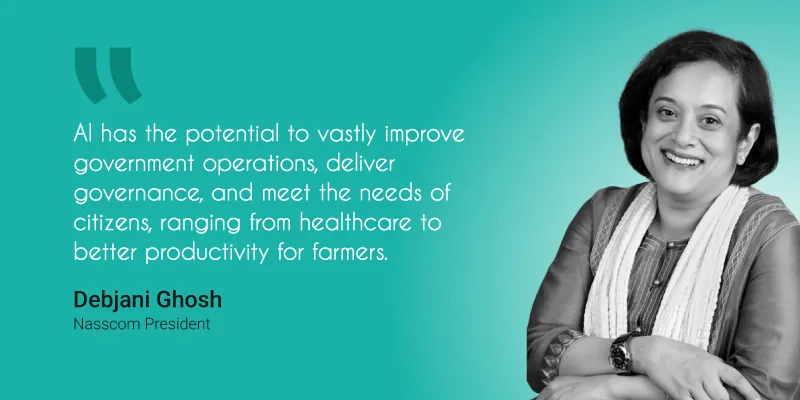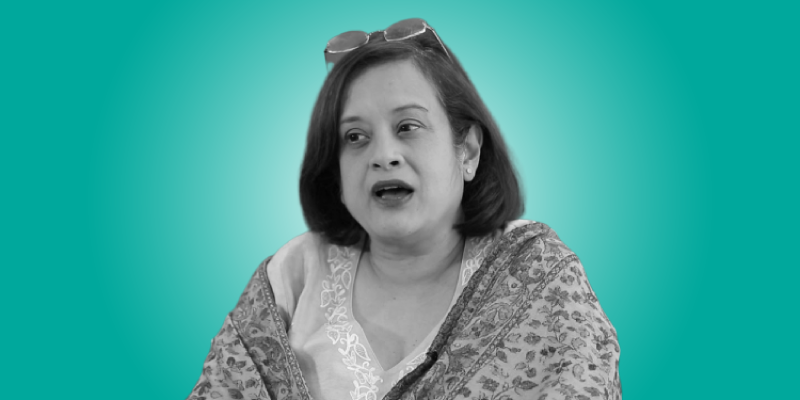AI for good: Nasscom’s plan for creating wider social impact using artificial intelligence
In an interview with YourStory, Nasscom President Debjani Ghosh explains the trade body’s plans to have deep engagement with startups in the area of AI and data science to come up with solutions that can address challenges faced by the country.
Artificial intelligence (AI) technology has rapidly proliferated and found several ways to solve problems, small and large. Coupled with other deep tech such as machine learning (ML), and big data, as well as with the use of cloud computing, AI has disrupted several sectors and is addressing complex challenges in the areas of health, education, sustainability, etc.
To unlock the potential of AI to address problems in the public domain, the National Association of Software and Services Companies (Nasscom), through its Centre of Excellence for Data Science & Artificial Intelligence (CoE – DSAI), launched its ‘AI for Good’ programme in December 2018.
In a conversation with YourStory, Nasscom President Debjani Ghosh says analytics, data science, internet of things (IoT), and AI hold the promise for the future, and explains how startups will play a key role in delivering these solutions.
Edited excerpts of the interview.
YourStory: What is the objective of Nasscom’s centre of excellence for data science and AI?
Debjani Ghosh: Nasscom CoE’s aim is to serve as a platform for intelligence-sharing and technology collaboration between stakeholders, to build collective capabilities for the industry and country in the cutting-edge areas of data science, and AI. They provide high-end technology, field expertise, and curated programmes to augment capabilities across academia, enterprises, government, innovators, and advanced startups. Working with the industry and government, they are identifying use cases for technology intervention in order to connect academia, industry, and policymakers to bring cutting-edge research to the market.
YS: What is the core focus of Nasscom’s initiative of AI for Good’?
DG: At Nasscom and CoE – DSAI, we believe that innovation and the use of AI at its core is to enhance people’s lives. India should not only be building AI solutions that reshape businesses globally but should also empower people leading to sustainable development. AI is already addressing some of the most common and complex problems in the public domain, be it delivering aid during natural disasters, citizen-centric services in smart cities, helping achieve health coverage, improving public safety, waste management, tackling pollution, enhancing efficiency in governance, etc. ‘AI for Good’ is about leveraging AI for efficient and effective use of resources for sustainable development, especially for a country like India where we have limited resources.

Also read: India created 170,000 tech jobs in 2018; AI, analytics, cybersecurity in demand: NASSCOM
YS: Will there be certain target areas for the AI for Good initiative?
DG: It is the largest platform and among the major initiatives in the country to surface various AI applications and solutions that will spawn massive changes, transform several public service sectors, industries, and departments, resulting in an optimised use of resources as well as improving productivity to make lives safer and better. The initiative is also clearly identifying the use cases or problem statements to align technology with the identified goals. It is facilitating assistance for relevant ministries and departments to build a necessary framework for adoption of these technologies by partnering with the AI innovator ecosystem that is involved in social entrepreneurship to bring about positive impact on societies.
YS: How is Nasscom encouraging the participation of startups in this initiative?
DG: The ‘AI for Good’ programme challenged participating startups and corporates from across the country to present their best deployed and deployable solutions that leveraged analytics, IoT, computer vision, robotics, augmented reality, virtual reality, and natural language processing (NLP) in areas of healthcare, agriculture, education, public utilities, safety, smart cities, natural resources, transportation, governance, waste management, and fiscal management.
The programme got an overwhelming response of nearly 200 submissions. The government is committed to working with these organisations working with AI to create social impact, and introduce their solutions to make a lasting and meaningful positive impact on the lives of nearly 68 million people.
YS: What is the expected social impact from initiatives like AI for Good?
DG: The initiative covers a couple of areas, the primary being problem-solving by working with stakeholders from various industries, and helping them understand business problems, and how the AI, IoT and other deep technologies can help them solve those problems by leveraging the startup ecosystem. This is done mainly with mature startups.
Second, we work on developing the problem-solving capabilities of startup innovators by making the IoT and AI labs available to them, which in turn can help them fast track the entire product development process. AI can be used to merge an individual’s omics (genomic, proteomic, metabolic) data with other data sources to predict the probability of developing a disease. Niramai, for example, is a startup using AI for pain-free breast cancer screening at an early stage.
India faces massive waste management challenges - inefficient waste infrastructure, lack of planning, and an increasing rate of solid waste generation per capita. Intelligent trash cans embedded with IoT sensors through their ML capabilities, can read, collect, and transmit information about trash volume, which is then processed to optimise the collection and disposal of waste. The system is optimised to reduce work time and save costs.
Another initiative coming up as a product of AI for Good is with NEC technologies developing face recognition technology to quickly analyse images from security cameras, making it possible to search for lost individuals, suspicious movements, and prevent mishaps from occurring. Nasscom CoE – DSAI is also working with the Karnataka Forest Department on using analytics and AI to optimise sales from timber and thus boost upkeep of forest reserves in Karnataka.
YS: What are the other initiatives by the COE to identify startups in this space?
DG: Startups in the area of industrial IoT and healthcare medical devices have successfully carried out multiple employee/citizen-centric projects. Examples include digital health camps in Karnataka, Andhra Pradesh, Maharashtra, etc. Nasscom’s CoE-IoT established the largest ecosystem for deep tech product innovation. There are over 40 startups, employing over 250 innovators who are building products and solutions in healthcare, sports, domestic appliances, industrial safety, predictive maintenance, etc, at the Indian Institute of Technology (IIT) Gandhinagar, Gurgaon, Bangalore, and Vizag. The CoE IoT present in Bengaluru has incubated 50+ startups (five graduated), and around 500+ startups in the extended ecosystem. The CoE in Gurugram has incubated several startups and is working with the Haryana government to digitalise the drought management system for timely prediction of drought.
YS: What will be the future roadmap of ‘AI for good’?
DG: The end result of these initiatives is market access with the government as a user of these innovative solutions. AI has the potential to vastly improve government operations, deliver governance, and meet the needs of citizens, ranging from healthcare to better productivity for farmers. A holistic approach is needed, as we find piecemeal/point solutions are not the answer. We are finalising engagements with specific government departments. As part of the plan, we will map problem statements across the value chain to technology solutions. In coordination with the government, the roadmap is to catalyse adoption of these innovative solutions.











